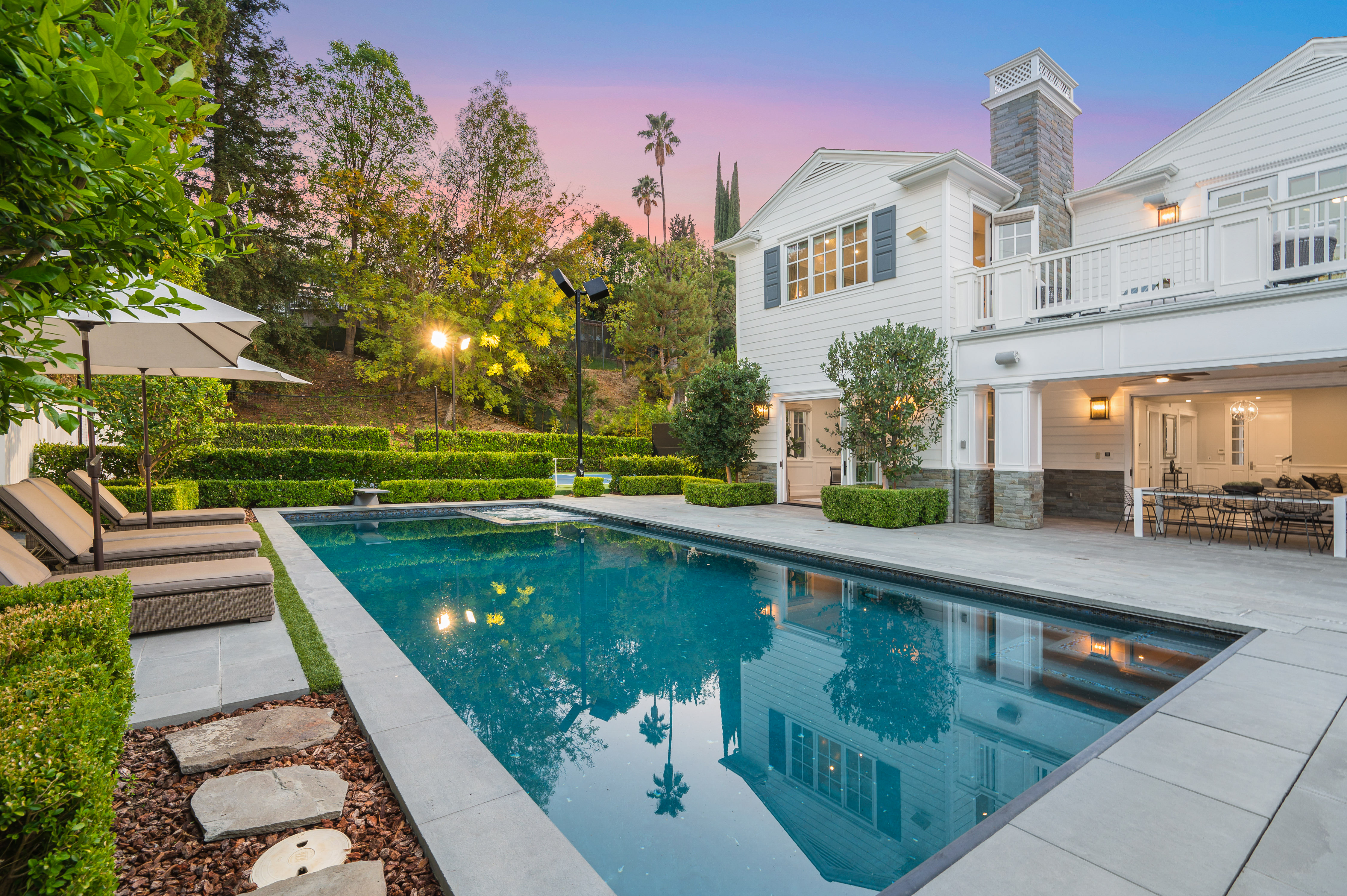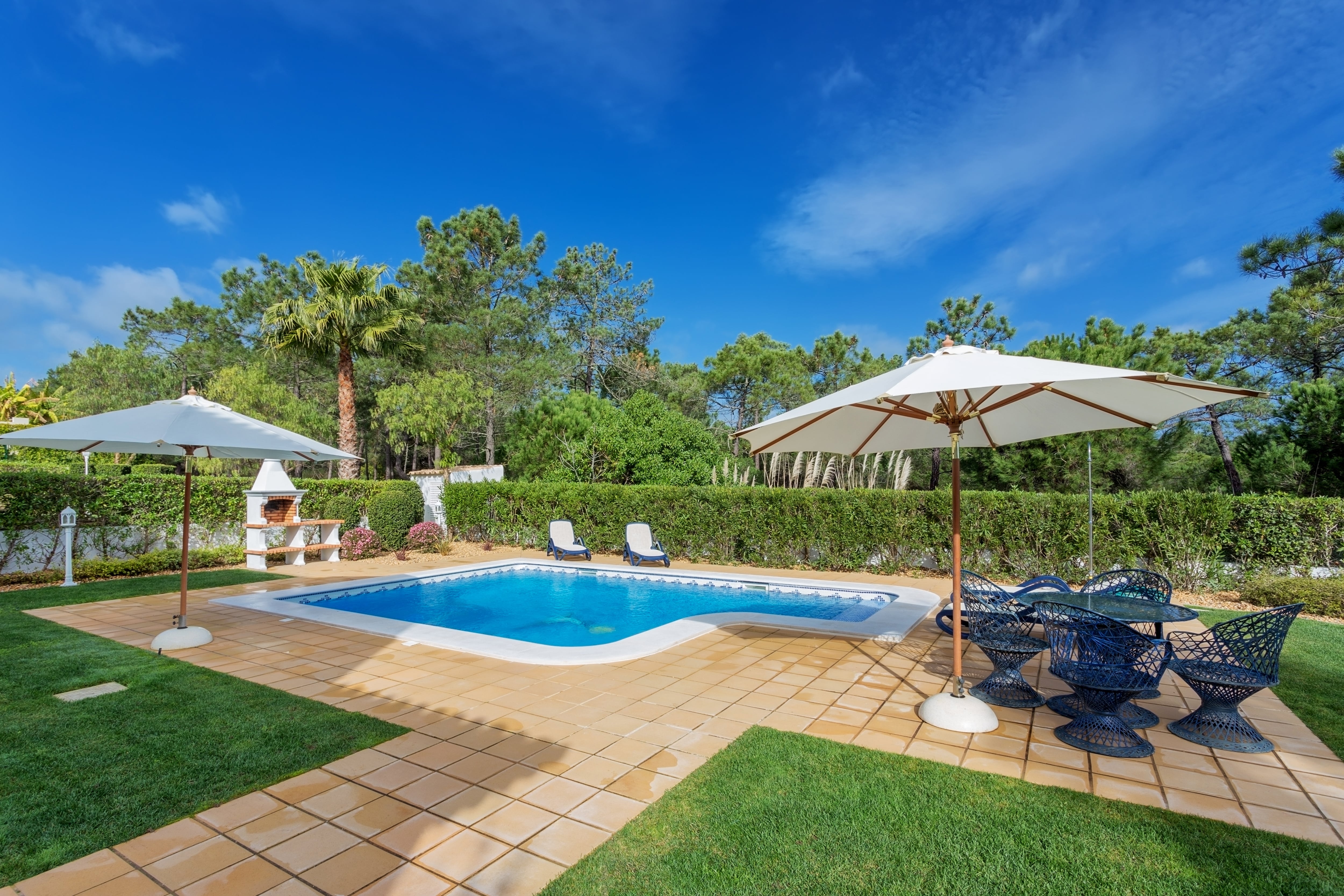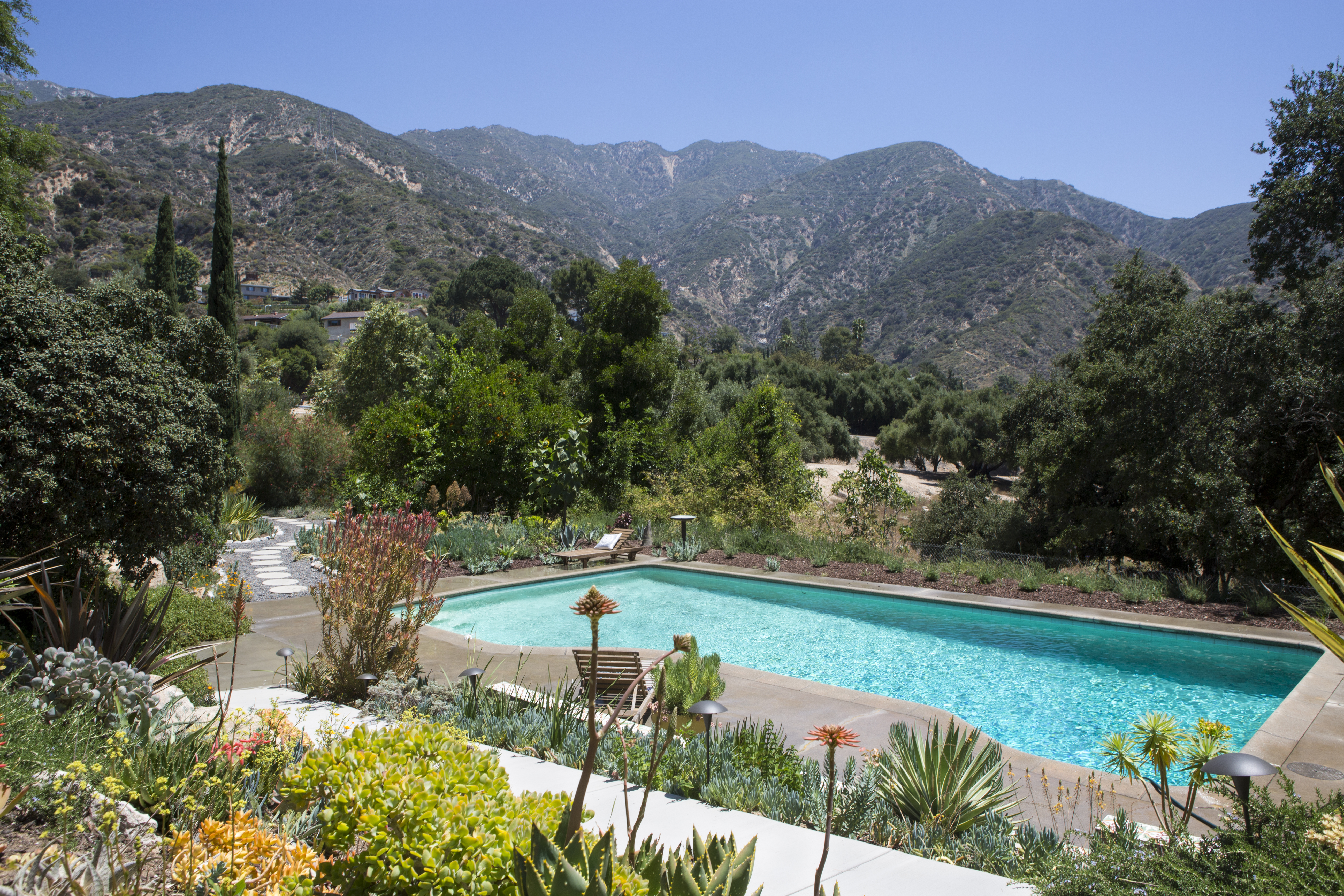
A pool can help you cool off and relax, but it’s important to plan for in-ground pool costs in Los Angeles. Here are the factors that affect the cost.
Pick the perfect pool for your property


Saltwater pools are gentler on eyes, skin, and swimsuits.
Chlorine is less corrosive to your pool and nearby fixtures.
Saltwater pools require less weekly monitoring and maintenance.
Traditional chlorine pools have higher seasonal maintenance costs.
There’s no better way to keep cool on a hot day than taking a dip in your own pool. While most people think of traditional chlorine pools when they think of backyard pools, saltwater pools have been gaining in popularity. Each has its pros and cons: Saltwater pools tend to require less upkeep, for example, while chlorine pools are often more durable and longer-lasting. Learn more about the differences between saltwater pools vs. chlorine and which is right for you.
The main difference between saltwater and traditional chlorine pools lies in the additives needed to keep the water’s chemical levels balanced and the equipment used to keep the pools running properly.
A chlorine pool, as the name suggests, uses added chlorine to keep the water sanitized. This is what’s responsible for the “bleachy” smell often associated with pools. A saltwater pool, meanwhile, uses salt as an additive, and the pool contains a salt chlorinator to convert salt to chlorine in order to keep the pool sanitized. The way that chlorine is made in a saltwater pool results in lower chlorine levels and avoids that distinct chlorine smell.
Saltwater pools are softer on your skin and eyes and can be better for those with allergies or asthma. That said, saltwater pools still contain chlorine, which is produced by converting pool-grade salt (aka sodium chloride) to chlorine through a process called electrolysis. So, though they have less chlorine, it’s a common misconception that saltwater pools are chlorine-free pools.
Installing a saltwater system will include a salt-chlorine generator—also known as a salt chlorinator—which converts salt to chlorine. This process also gives the pool its saltwater feel, so you might also hear it called a saltwater generator. Overall chlorine levels in a saltwater system are still about 1/3 lower than traditional chlorine pools. You will need to add salt for the pool to run, but you’ll add fewer chemicals on a regular basis.
| Pros | Cons |
|---|---|
| Less maintenance | Higher upfront cost |
| Gentler on swimwear | Corrosion of components |
| Less irritating for sensitive swimmers | Most maintenance isn’t DIY |
Best For:
Swimmers with skin sensitivities, allergies, or asthma
Those sensitive to the smell of chlorine
Homeowners who want a pro to take care of maintenance and upkeep
Saltwater pool maintenance is less involved than maintenance on a chlorine pool
Seasonal additive costs are less expensive
Less likely to cause irritation for people with sensitive skin, allergies, or asthma
Gentler on swimwear
The salt chlorinator runs off electricity, generating cleaning agents without having to add chlorine manually
There are fewer chloramines—the molecule that causes the chlorine smell and feel—than in chlorine pools
Higher upfront cost: The average cost of a saltwater pool that’s 12 by 24 feet is about $25,000
Saltwater can damage pool equipment or even the pool itself if not explicitly designed to resist saltwater corrosion
Fixture damage can include anything in the splash zone for the pool including patios, grills, and paving stones if not properly sealed
Saltwater pools require a pro to do maintenance such as pH management and repairs
Your chlorine generator won’t function properly when the temperature dips below 60°F

Traditional chlorine pools are kept clean by adding swimming pool chlorine, which you’ll need to do at least twice per week. You may also need to add other chemicals to raise or lower the pool’s pH. But although they require more routine maintenance than saltwater pools, the upkeep is easier for a homeowner to DIY. In addition, the cost to build a pool is comparatively lower if you chose chlorine instead of a saltwater system: The average cost of installing a 12 x 24 inground chlorine pool is around $23,000.
| Pros | Cons |
|---|---|
| Lower installation cost | High seasonal maintenance cost |
| More durable | More frequent maintenance needed |
| Easier to DIY maintenance and small repairs | Chlorine can be irritating |
Best For:
Homeowners who don’t mind DIY maintenance
Those looking for a more durable option
Anyone who wants more choices for pros to service and repair
Lower upfront cost for installation
More DIY options for common problems
None of the extra costs associated with a salt-chlorine generator
Easier to find a knowledgeable pro in case of a problem
Less corrosive to pool elements and fixtures nearby
Higher amount of chlorine
Seasonal costs of chlorine can be as high as $600 to $900
More day-to-day maintenance of pool water
Harsher on the skin and eyes, and can aggravate allergies or asthma
Harsher on swimsuits

If you’re thinking about making the switch, the cost to convert a chlorine pool to saltwater averages from $500 to $5,000, including parts and installation. The choice comes down to personal preference and individual needs.
If chlorine smells like summer to you and your DIY experience means the day-to-day upkeep is no problem, chlorine might be the better choice. If you or someone in your household gets itchy skin and eyes from chlorine—or worse—a switch to saltwater might be worth it. No matter what you decide, keep the pros and cons in mind when it comes to maintenance and costs.
So how do these two types of pools measure up against each other? You might have a preference for one over the other regardless of how they stack up, but here is the rundown.
When it comes to durability, saltwater is harsher on the surfaces and fixtures of your pool— especially without a proper seal or if they have a leak. This is why many experts advise installing a fiberglass liner if you decide to go with saltwater.
For a saltwater pool, your saltwater generator will also need to be replaced every 5 to 7 years. Chlorine—though harsher on your body and your clothes—doesn’t have the same kind of corrosive effect.
For installation, chlorine pools have a lower initial cost. But saltwater is a bit less expensive to maintain from season to season. In the long run, issues with pools can be unpredictable—and you never know when you might need to call in a pro. That’s why we’re calling this one a tie.
Most troubleshooting for a chlorine pool can be done by a motivated DIYer. Meanwhile, for saltwater systems, you’ll need to call in a pool technician for pH or maintenance problems. Likewise, fixtures or other pool repairs for chlorine pools can sometimes be tackled by homeowners. But, the corrosive nature of saltwater means you’ll definitely want to call in a pro to ensure longevity on repairs.
Other than clarity and skin-friendliness, maintenance is one of the main reasons people pick saltwater pools. Pool owners still need to watch for chlorine build-up and call in a pool technician for issues, but weekly maintenance is minimal. Chlorine pools require a minimum of semiweekly monitoring of pool water and the addition of chlorine tablets or liquid. For that reason, this one goes to saltwater systems.
Both saltwater and chlorine pools are available in a wide variety of shapes and sizes, but because of saltwater’s corrosive nature, chlorine pools have more options when it comes to pool materials. In most areas, there are also more local swimming pool installers who work with chlorine pools than saltwater ones, so you may have a broader array of designs available if you go with a traditional chlorine pool.
Many people think saltwater pools are more eco-friendly, but that isn’t necessarily the case. Both types of pools use chlorine; saltwater pools convert their own, while chlorine pools have it as an additive. Saltwater pools generate less chlorine-based gasses than chlorine pools, but the salt chlorinator runs on electricity and needs to be replaced every 5 to 7 years. The runoff from a saltwater pool can also harm the surrounding landscape.
On the other hand, more waste is generated from chlorine pools due to the higher volume of maintenance chemicals required. All those bottles of chlorine add up over the season!
Because of saltwater pools’ lower seasonal maintenance costs, you may be able to recoup your initial investment much faster than with a chlorine pool. And while there’s no guarantee you’ll see an increase in property value to match the cost of the pool, for many buyers, a saltwater pool is a very appealing feature. When it comes time to sell, you may find more prospective buyers who’d rather have a saltwater pool than a chlorine one, and that can be reflected in your selling price.
Kaitlyn Pacheco contributed to this piece.
From average costs to expert advice, get all the answers you need to get your job done.

A pool can help you cool off and relax, but it’s important to plan for in-ground pool costs in Los Angeles. Here are the factors that affect the cost.

A well-maintained pool can add significant value to your home, so why not dive into a remodel? This guide covers pool remodel costs in Los Angeles.

Pools are plentiful in California, but they require consistent maintenance and upkeep. This guide outlines pool liner replacement costs in Los Angeles.

Not sure what type of pool would suit your yard best? Use this guide on the different styles and designs to maximize appeal and utility.

If you own a pool, you may wonder: how many gallons in my pool? Read on for our pool volume calculator to learn how much water is in your swimming pool.

When a murky mess interrupts your morning laps, you need to know how to clear cloudy pool water fast. These top cloudy water fixes will keep you afloat.